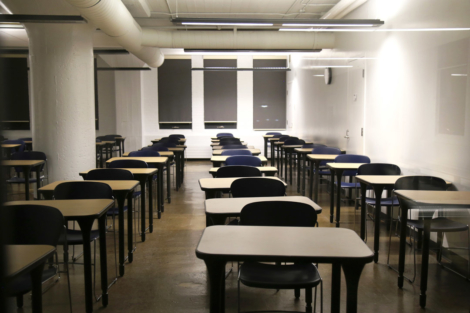To address violence, we need to build an inclusive future
Re: “Association of Political Science Students hosts panel on gun violence in Toronto”
The recent panel, organized by the Association of Political Science Students, brought different perspectives and experiences for a much-needed conversation about the record levels of gun violence plaguing Toronto.
Despite much agreement between panelists, especially on the fact that policing alone isn’t a sufficient response, potential solutions remain open for debate.
What’s really needed is an approach beyond addressing gun violence symptomatically. There should be more commitment toward understanding and supporting communities most affected by it if there’s to be any hope for building bridges and restoring trust.
Disadvantageous socioeconomic conditions and opportunity gaps present significant challenges for communities and contribute to the marginalization of individuals to the perimeter of society. This is where the most vulnerable are at risk of falling over the edge. Also unhelpful are cuts to social programming and gaps in program accessibility. These issues require remedies that go beyond mere band-aid approaches to resolve because, frankly, these problems are not self-resolving.
Social programming is a long-term initiative that isn’t the domain or initiative of any one government’s term of office. It requires a greater societal commitment toward building a more inclusive future that encourages the participation and contributions of all its members.
This includes the Toronto Police Services (TPS). According to its mission statement, the TPS are committed to reflecting and growing because they don’t have all the answers. Therefore to seek and act on input from the communities they serve means acknowledging and learning from their mistakes and successes.
In order for the TPS to fulfil its greatest potential for the benefit of all society, it’s necessary that it listens to the voices of those whom it’s sworn to serve and protect.
Short-sightedness or their own worst enemy?
Re: “Arts & Science exam schedule takes longer to complete due to large size, unclear central planning body”

SHANNA HUNTER/THE VARSITY
It seems that a lack of central administration is undermining U of T’s reliability to efficiently provide students with a final exam timetable, a problem seemingly unique to U of T.
While the process and combinatorial problem underlying the dynamic nature of scheduling exams intends to minimize student conflicts and is difficult and undoubtedly complex, I question whether the university’s excuses are really just a deferral of responsibility.
The university didn’t suddenly find itself underprepared to deal with larger attendance, since, after all, it promoted and oversaw the implementation of policies for its expansion. Is the university’s administration a victim of its own short-sightedness, or is it its own worst enemy because it plans for exponential and unsustainable growth?
I believe that the university, in lieu of hiring a central staff for this process to avoid overburdening its current staff, should stand to benefit by reaching out to more counsel and demand solutions to alleviate its administerial woes.
Otherwise, it should feel encouraged to get creative and, while not overextending itself, could ask faculty to chunk large courses and provide students with a variety of date and time options by making different exams for different sections of the same courses. This would allow students themselves to avoid conflicts by selecting between available sections. This is, perhaps, a better way that administration might defer responsibility and is surely better than delegation without a central command.
I once heard a common problem troubling many leaders likened to the problem a carriage might face when its ten horses are all travelling in different directions. Perhaps that’s the real issue underlying the administration’s difficulties with scheduling exams.
Oscar Starschild is a second-year Mathematics, Philosophy, and Computer Science student at Woodsworth College.


